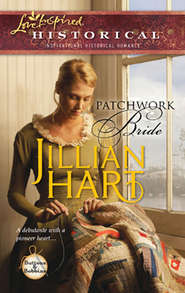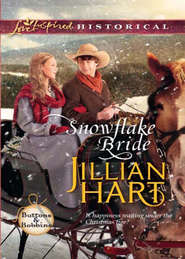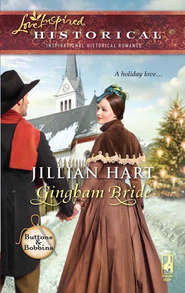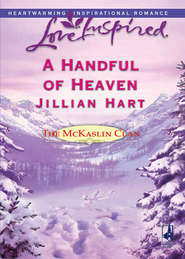По всем вопросам обращайтесь на: info@litportal.ru
(©) 2003-2025.
✖
Montana Wife
Настройки чтения
Размер шрифта
Высота строк
Поля
The service was over, and so should the dream be, too. Rayna stood up from the hardwood chair someone had brought earlier from inside the church. Betsy, her dear friend, guided Rayna around the corner of the grave where a pine casket lay with Kol inside.
But if this was a dream, why could she see the green grass and breathe in air tainted with the sharp scent of earth? How come she felt the grief like the breeze on her skin?
“That’s it,” her other dear friend, Mariah, was at her other side, clutching her other arm. “Step up here. That’s right. Betsy, she needs to lie down.”
“I’ll run up and ready her bed,” another voice said from somewhere beyond the haze of her despair.
Footsteps dashed off, or was that the uneven thump of her own shoes on the porch steps? Rayna was confused, but from the moment Dayton’s daughter had knocked on her door with the news of Kol’s collapse and death, time had stood still.
He’s not dead. He can’t be dead. The force of fear and grief and loss expanded like a soap bubble beneath the whalebones of her corset.
Her eyes snapped open and she was sitting in bed in the dark. The hot sun and green cemetery had vanished. The peaceful stillness of night surrounded her. So, she’d been dreaming, after all, but Kol’s death was still a reality.
A faint glow from a setting moon gleamed on the lace curtains breezing at the window, illuminating the patchwork quilt on the bed. The quilt she’d made during Kol’s courtship. The patches she had cut and sewed with care, every stitch of her needle made with all of the love in her heart for Kol and with the hope for a happy future as his wife.
The harsh rasp of her breathing was the only sound in the room. The hope chest tucked beneath the window, the chair in the corner, the graceful curve of her looking glass by the wardrobe were all as they should be. See? Everything was fine.
But it wasn’t.
She didn’t have to look beside her to see the truth. She could feel the empty place where no man lay sprawled on his back. Hear the silence instead of the rhythmic snoring that had disturbed her sleep for the past fifteen years. There was no comforting warmth in her bed.
She was alone.
The faint hues of the interlocked circles on her quilt, representing wedding rings that by day were a cheerful calico patchwork, were shades of gray in the night. Cold prickles, as sharp and as merciless as needles, stabbed behind her eyelids.
No amount of wishing would bring her dear Kol back. He was dead and buried. His heart had failed him while he’d been helping the neighbors with their harvesting. He was never coming back.
Ever.
Rayna wrapped her arms around her waist, as if she could hold in the pain and the sorrow lodged in her heart.
“Ma!” A little boy’s fear vibrated in that single word. “Ma, Ma!”
She was out of bed and across the hall faster than a bolt of lightning could travel, on her knees beside her youngest son’s bed before he could cry out again. Hans was in her arms, that sweet smell of little boy, the warm, solid dearness of him.
She was grateful that he was safe and tucked against her heart, his sobs shaking through her as if they were her own. She would give her life to make his pain stop.
“Mama’s right here, my baby.” She pressed kisses to the crown of his head where the cowlick just like Kol’s stuck up at all angles. “Mama’s here. It’s all right.”
“I d-dreamed about P-Papa.”
“So did I.” She rocked him, her dear, precious child, cradling him tight, trying to will all the pain out of him and into her. But he cried all the same.
Helpless, she could only comfort him until his sobs quieted into tears and, finally, aching silence.
She laid him on his bed and tucked the sheet snug around his chest. He was lying as if asleep. He wasn’t. She could tell. How did she make this better? This was no cut knee to bandage or no broken toy to fix.
She sat on the edge of his feather mattress and sang the lullabies her mother had sung to her in Swedish, her first language. She no longer remembered what the words meant, but the songs were melodies of love and comfort, and so she sang until her throat turned hoarse and her son relaxed into a dreamless sleep.
Only then did she rise, blow a kiss to his brow and steal from the room. She left his door ajar so she could hear him should he stir again.
Her bare feet whispered on the polished floorboard and emptiness accompanied her to her room. The moon had set and there was only stardust to guide her to the window as she brushed the lace curtains from the sill and gazed out at the seed-heavy fields of wheat.
Wheat that had to be cut before the grain fell from the stalks. But how? Kol, how am I going to do this without you?
You will find a way, you always do. That was his voice she heard in her thoughts, words he would often say to her. Remembering him renewed the pain of his passing. Made the ache within her explode and leave only pieces of her heart as she buried her face in her hands.
She had children. A homestead. Responsibilities. Yes, she would find a way. What hurt to the depths of her being was having to make her way without Kol.
It wasn’t being alone that troubled her the most. No, what broke her from the inside out was realizing the night would end. Dawn would come. She would have to live that day, while Kol could not.
Unable to climb into her lonely bed, she sank to her knees on the unforgiving floor. She buried her face in her hands and cried for the life Kol would not have.
For the care she would never be able to give to him. She cried for the man she’d vowed to cherish until death parted them.
Death had parted them. The love had not.
It was too soon after the funeral and Daniel Lindsay knew it, but what was he going to do? Let the opportunity go to someone else? No. His conscience troubled him, but it didn’t keep him from rapping on the Ludgrin’s front door even though two whole days hadn’t passed since the funeral.
Life went on; it was the sad truth. He couldn’t say he knew what it was like to lose a loved one. He’d never had any family that he remembered to lose—
The glass handle turned and the door squeaked open. A round-faced little boy gazed up at him with sad eyes. Daniel pegged the little guy to be about seven or eight years old, too damn young to be without a father. This, Daniel sorely knew.
“Is your mother home?”
His solemn eyes blinked. The breeze batted at his white-blond hair sticking straight up at the crown. “Ma’s out back.”
Out back? Probably tending to the livestock. Kol might be gone, but the cattle still needed fresh water. “I’ll go look for her.”
“She’s hard to find cuz the wheat’s so tall. I gotta watch her from the window upstairs.” The boy pointed straight through the roof.
His chest ached for the tyke, who was anxious to keep track of his mother as if he could lose her, too. Daniel couldn’t help feeling sorrow, for he knew something about loss. He’d grown up in a string of orphanages. He knew what it was like to wish for a family lost. It was sad this son of Kol’s would know the sting of loss the rest of his life. No kid should have to live with that. It left scars on the man Daniel was to this day.
How would it affect the little Ludgrin boy?
The door squeaked closed as he knuckled back his hat and followed the wraparound porch to the steps leading to the side yard.
Flowers bloomed everywhere, fat roses and yellow climbing flowers that smelled good enough to eat. There wasn’t a weed in sight, and that said something about the care Rayna Ludgrin took with her house and, he hoped, with her life.
Would she be fair? Would she listen to what he had to say, even if it wasn’t the most appropriate time to be saying it?
As he opened the white, hand-carved gate and clicked it shut behind him, he could see the care Kol had taken, too. Kol had been a good man. Judging by the look of the place, he’d been a good husband. The barn was newly painted, the roof in good repair. Every joint in the split-rail fence solidly hewn. The cattle looked well fed. The sleek, matched bay horses were groomed and their brown-velvet coats gleamed with fine health.
Surely his wife wouldn’t want to see all her husband’s hard work fall to ruin. It wasn’t as if she could harvest the hundred and sixty acres herself.
Where was she? Daniel looked around, in case he had somehow missed her. He was alone in the shade of the fruit trees. She wasn’t at work in the ripe acre-size garden. Nor was she in the pasture where the livestock drowsed in the hot afternoon sun.
How far out back had she gone? Daniel wandered past the fence line and called out a greeting before he stepped foot inside the barn. Only the faint echo of his hello in the rafters and the beat of his boots on the hard-packed earth answered.











